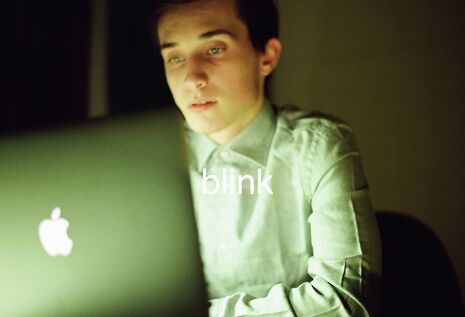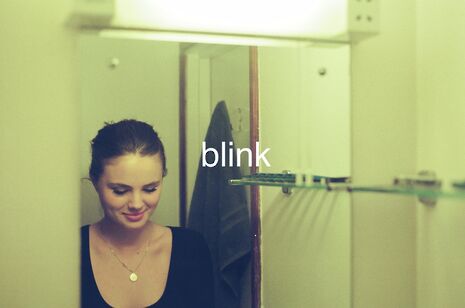Preview: Blink
We talk isolation and the overlap between social media and stalking with the cast and crew of Blink

I arrive at the Corpus Playroom in the middle of a conversation about buying rubber washer and being followed. It is a little unsettling, and I wonder if I have stumbled into a moment of genuine awkwardness between friends. The boy stands and paces; the girl sits, not making eye contact. I feel that perhaps I should come back later...
Joe and Dolores then break, and share a private giggle about wording and lines, and Amy steps in to rearrange the angles a bit. The atmosphere of this rehearsal for Blink is dark and edgy. Another few lines in, and I really want to go straight to seeing the finished production.
Amy Malone, director of this very modern two-man show, explains what drew her to the play. “It is a bit of a weird one,” she says, with a mischievous relish. “It is a dysfunctional love story. It shows how, although we are more connected than ever through technology, so many people feel lonely and totally isolated.”

She talks about the pressure of keeping the audience’s attention with just two characters, and the psychological intensity of getting so deep into their worlds. From what I see in rehearsal, the goal of keeping my attention has been more than achieved.
Dolores Carbonari explains more about her character, Sophie. “After Sophie’s father dies, someone new moves into his flat, and she posts a baby-monitor camera through the postbox, without explanation.” (I stop to check that I have heard this correctly. Disturbingly, I have.) And what follows, she says, is essentially consensual stalking.
Joe Pitts, who plays the newcomer Jonah, adds that “there is watching, but no other interaction. They don't make contact. But, with her knowledge, he follows her into the real world, silently.” She lives her daily life with him observing, at a distance. Knowing he is watching gets her through her day. Without being seen, it seems, people cease to exist. Without someone to view our photos, selfies and food-pics, then what we do hasn’t really happened.
Assistant director Ellen McGrath shows me around the Playroom, detailing the multimedia approach of the production: cameras and projectors mix with the monologues and conversations. The world of social media, phones and instant sharing comes alive around us. And I’m fascinated to learn that no one involved has ever seen a production of this play: this is exclusively the vision of the directors and cast, raw and unadulterated by any previous interpretation.
What strikes me is the honesty of the piece. The two actors, although very different to the characters they play, slide seamlessly into their roles. It takes me a while to figure out which lines are conversation and which are quotes, as this tightly-knit foursome joke around me. Nervous about admitting any similarities with his real self, Joe concedes that it is exciting to get to play an age-appropriate part dealing with some extreme, but relevant, issues. Not just in the urban isolation of London, but within the apparently socially vibrant world of the Cambridge undergrad.
An unsettling piece of genuine 21st-century writing, Blink in a way follows on from Powell’s Peeping Tom, Walsh’s Disco Pigs and at a distance Ionesco’s The Chairs. The difference is, after seeing this fabulously crafted production, you will definitely want to change the privacy settings on every account you have. And you’ll never again invite the world to view your photos.
Blink will be on from 25th to 29th October in the Corpus Playroom
 News / Clare Hall spent over £500k opposing busway 24 December 2025
News / Clare Hall spent over £500k opposing busway 24 December 2025 Comment / The ‘class’ of Cambridge24 December 2025
Comment / The ‘class’ of Cambridge24 December 2025 News / Caius mourns its tree-mendous loss23 December 2025
News / Caius mourns its tree-mendous loss23 December 2025 Comment / League tables do more harm than good26 December 2025
Comment / League tables do more harm than good26 December 2025 News / Girton JCR publishes open letter expressing solidarity with Palestine25 December 2025
News / Girton JCR publishes open letter expressing solidarity with Palestine25 December 2025








